Key takeaways:
- Understanding imposter syndrome involves recognizing feelings of inadequacy and the tendency to attribute success to luck rather than ability.
- Challenging negative self-talk and surrounding oneself with a supportive network significantly improves self-confidence and helps in overcoming feelings of fraudulence.
- Practicing self-compassion and reflecting on achievements are essential strategies to combat feelings of inadequacy and reinforce personal growth.

Understanding Imposter Syndrome
Imposter syndrome is that nagging feeling that many of us experience—despite evidence of our achievements, we often question our capabilities. I vividly remember when I landed a significant promotion; the moment should have felt triumphant, but instead, I was consumed by doubt. I kept wondering, “What if they made a mistake in promoting me?” It’s a paradox that many high achievers face, believing their success is merely luck or timing rather than their skills.
At its core, imposter syndrome can stem from perfectionism and the fear of being exposed as a fraud. I, too, have been there, meticulously preparing for presentations, thinking, “What if they find me out?” This fear can be debilitating. It’s almost as if we wear a mask, projecting confidence while feeling a storm of self-doubt inside. It’s essential to recognize these feelings and understand that they are common.
Many of us grapple with comparing our journey to others, which only intensifies these self-doubts. Reflecting on my own experiences, I’ve realized how important it is to remind myself that everyone’s path is unique. Have you ever noticed how much more critical we are of ourselves than the friends and colleagues around us? Those feelings can highlight our insecurities, but acknowledging them is the first step towards overcoming this internal struggle.
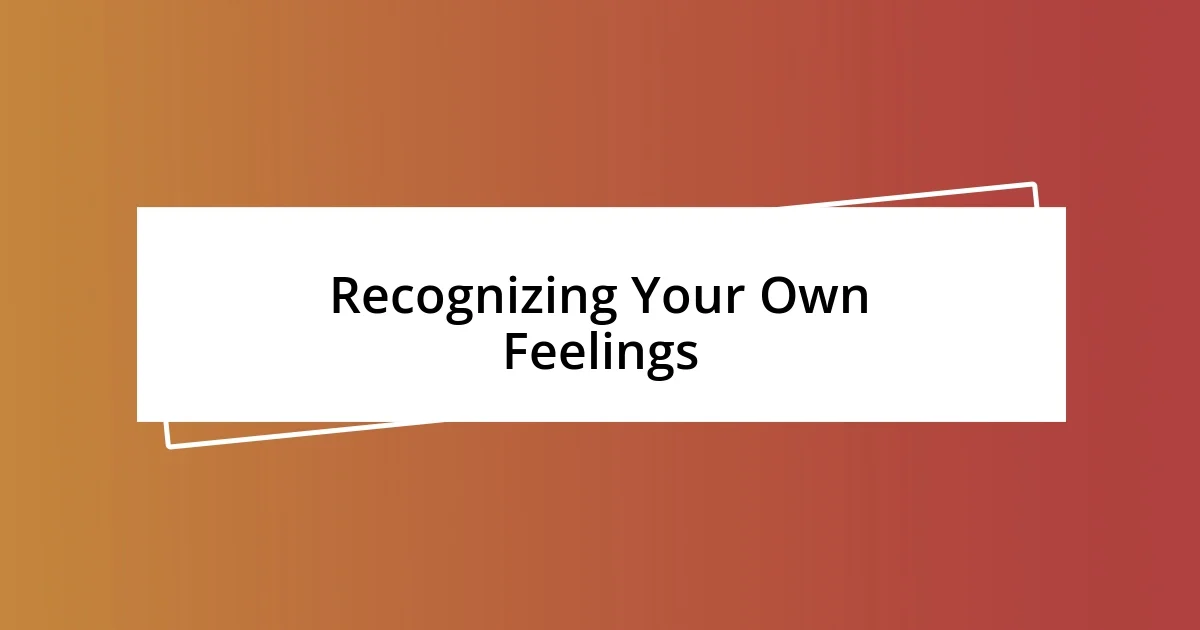
Recognizing Your Own Feelings
Recognizing your own feelings is a crucial step in addressing imposter syndrome. I often find that when I take a moment to sit quietly, breathe, and reflect, the swirling doubts can start to clarify. In one instance, after submitting a project I was particularly proud of, I was overwhelmed by anxiety, fearing it might not be good enough. By openly acknowledging those feelings of inadequacy, I took the first step toward understanding their root cause.
Here are some signs that may indicate you are grappling with imposter syndrome:
- Overanalyzing your performance and focusing only on what you could have done better.
- Feeling like a fraud when praised for your achievements, attributing them to luck instead of your skills.
- Comparing yourself to peers, often feeling inferior despite your track record of success.
- Dismissing compliments or positive feedback, thinking others are simply being nice.
- Experiencing anxiety before sharing your ideas in meetings or presentations, doubting their value.
Each time I reflect on these feelings, I become more aware of their impact. Recognizing them helps me understand that I’m not alone in this experience, and it’s a natural part of my journey.
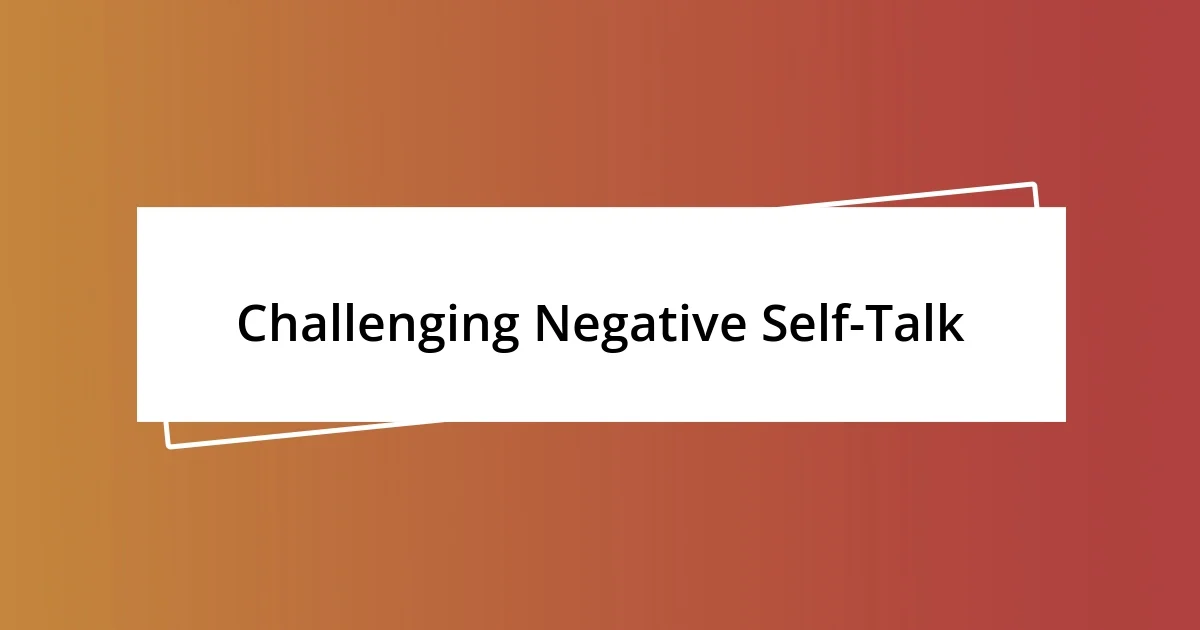
Challenging Negative Self-Talk
Challenging negative self-talk is a vital component of overcoming imposter syndrome. I often remind myself that the inner critic, while loud, doesn’t always convey the truth. For example, during a challenging project, I caught myself saying, “You’re not capable of leading this,” but I turned that thought around by recognizing my past successes. By actively disputing these negative assertions, I create a more positive narrative in my mind.
There are times when I feel like I don’t belong in certain settings, especially among highly skilled colleagues. I recall sitting in a meeting, feeling overwhelmed, as if everyone else was more competent than I was. Yet, instead of internalizing this negative self-talk, I decided to ask a question. It not only helped me gain clarity, but it also made me realize my insights were just as valuable. Each time I challenge these thoughts, I grow more confident, proving to myself that my voice matters.
Building a habit of positivity instead of negativity takes time and persistence. My mantra has become, “I am learning and growing,” which allows room for mistakes and imperfections. It’s a reminder that self-improvement is a journey, not a race. How do you handle negative thoughts? I hope you consider flipping them into empowering affirmations to foster a healthier mindset.
| Negative Self-Talk | Challenging Thought |
|---|---|
| “You’re not capable.” | “You’ve succeeded before, so you can do it again.” |
| “Everyone is better than you.” | “You have unique insights; your perspective is valuable.” |
| “You’ll never get it right.” | “Every mistake is a learning opportunity.” |
| “They’ll figure out you’re a fraud.” | “Confidence grows with experience; keep pushing forward.” |
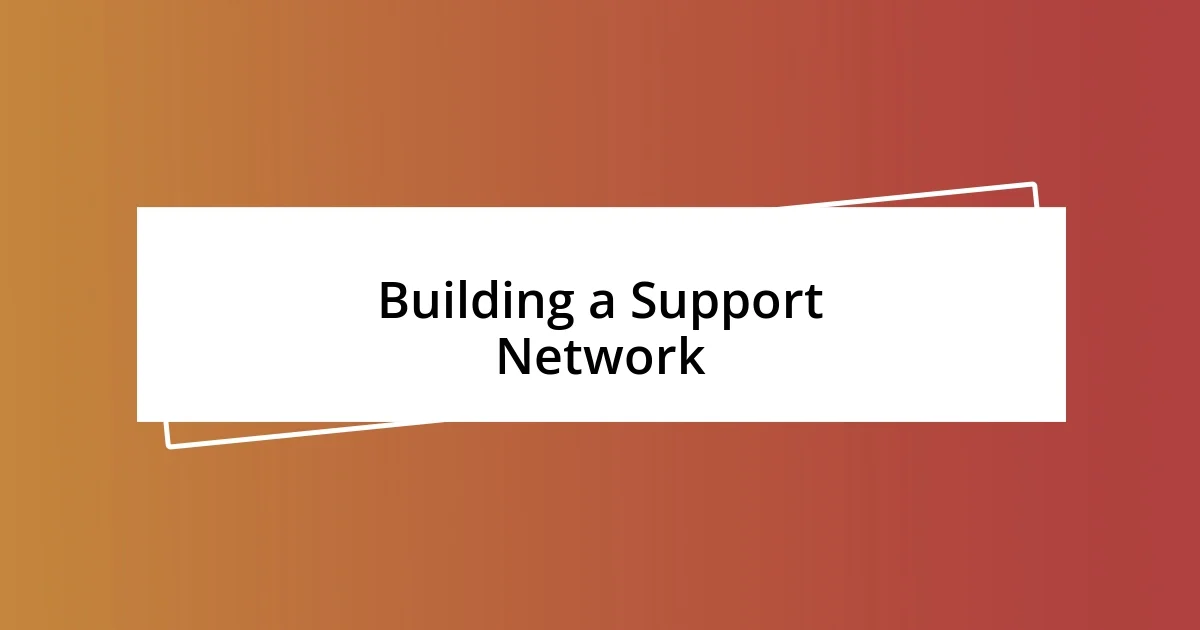
Building a Support Network
Building a support network has been a game-changer in my journey with imposter syndrome. When I started reaching out to colleagues and friends who shared similar feelings, I realized just how common these experiences were. I remember one evening, sitting with a close friend over coffee, confessing my fears about not being “enough.” To my surprise, she revealed her own struggles with self-doubt, and we spent hours sharing our stories. That moment of connection helped me see that I wasn’t alone.
I consciously chose to surround myself with people who uplift and encourage me. Finding mentors and peers who validate my efforts made a significant difference. For instance, after joining a professional group, I felt motivated to contribute more. It was refreshing to hear others openly discuss their insecurities, which made me feel more comfortable voicing my own. How often do we hold back because we fear judgment? Sharing our vulnerabilities can actually strengthen bonds and foster a sense of belonging.
Additionally, I’ve learned the importance of reciprocal support—it’s not just about seeking help, but also giving it. Engaging with others about their struggles not only empowers them but reinforces my own confidence. I vividly recall reaching out to a colleague going through a rough patch. Listening to her and offering my support shifted my focus from self-doubt to collective growth. This mutual encouragement creates an uplifting space, allowing everyone to flourish—reminding us that we’re in this together and can thrive as a united front.
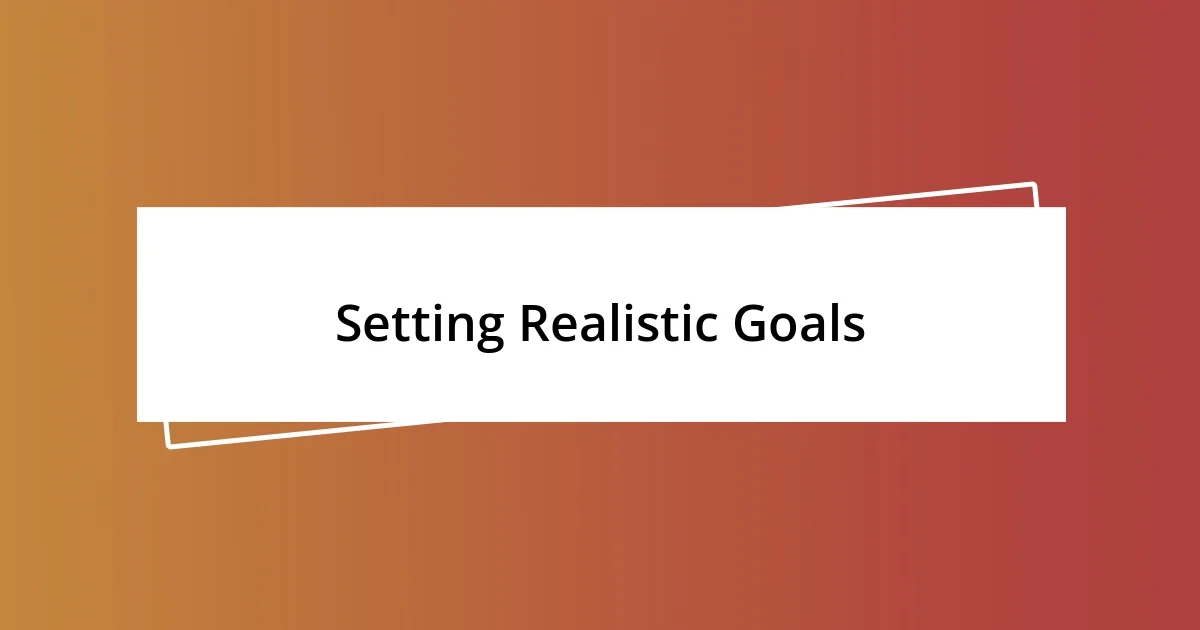
Setting Realistic Goals
Setting realistic goals has dramatically changed how I combat imposter syndrome. Instead of overwhelming myself with lofty aspirations, I’ve learned to break them down into smaller, manageable tasks. For instance, when I told myself I wanted to master a complex software, I focused on learning one feature at a time. This approach not only made the process less intimidating but also allowed me to celebrate small victories along the way.
I often find myself reflecting on the significance of achievable milestones. One time, I set a goal to complete a challenging presentation. Rather than aiming to make it perfect, I focused on just preparing one slide each day. By the end of the week, I felt a sense of accomplishment and confidence in my work. Have you ever noticed how celebrating small wins can create momentum? It shifts your focus from what you lack to what you’ve already achieved.
Creating checkpoints for growth gives me a clearer view of my progress. I remember when I felt stuck, thinking I hadn’t made any advancements in my career. However, revisiting my goals revealed that I had launched several successful projects and gained new skills. I realized progress isn’t always measured by grand gestures but often by the small steps we take each day. Setting realistic goals has helped me navigate the uncertainties of imposter syndrome, reminding me of my journey’s value.
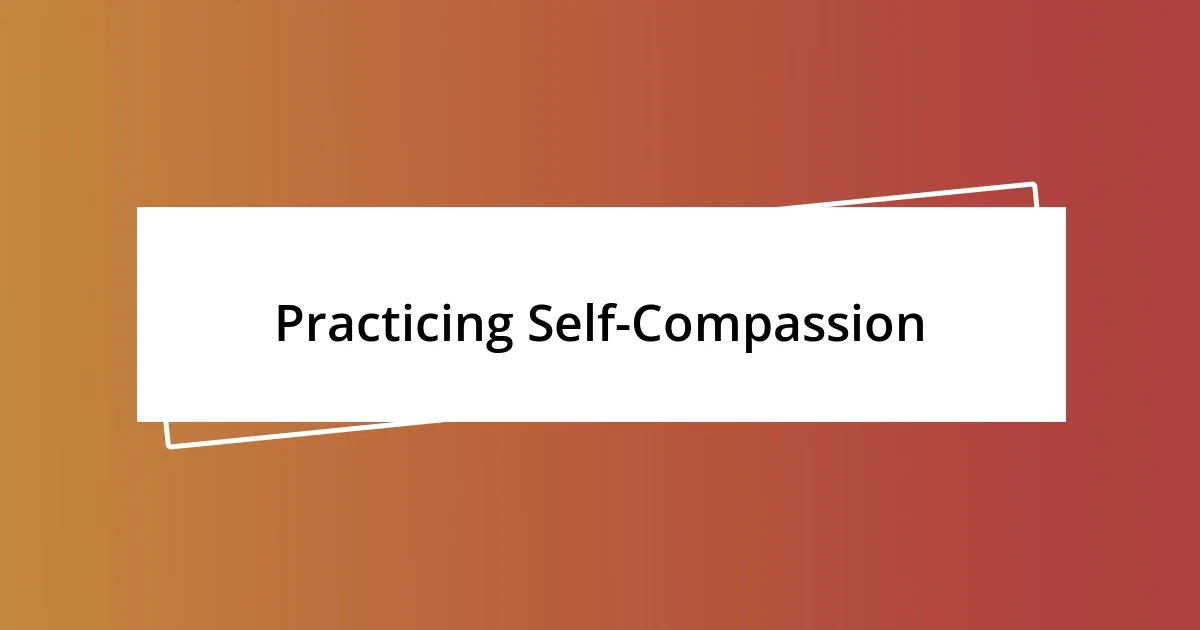
Practicing Self-Compassion
Practicing self-compassion has become an essential part of my routine in dealing with imposter syndrome. I often remind myself that it’s okay to feel vulnerable and imperfect; after all, we’re all human. I vividly recall a day when I received critical feedback on a project that I had poured my heart into. Instead of drowning in self-criticism, I made a conscious effort to treat myself with the same kindness I would offer a friend—acknowledging my feelings without judgment.
One particular moment stands out when I learned the power of self-compassion: I was preparing for a big presentation and felt a wave of anxiety wash over me. As the doubts crept in, I paused and reminded myself that mistakes are part of growth. I asked myself, “What would I say to someone I care about in this situation?” This simple shift in perspective allowed me to approach the presentation with a calmer mindset, ultimately enhancing my performance.
I’ve also discovered that self-compassion is about creating a nurturing inner dialogue. During instances of self-doubt, I often have conversations with myself, much like I would with an encouraging mentor. I’ll reflect on my achievements, reminding myself of my unique skills. Have you ever tried this? By fostering that gentle, supportive voice within, I’ve noticed it transforms the way I respond to challenges and failures, allowing me to embrace them as learning opportunities rather than as markers of inadequacy.
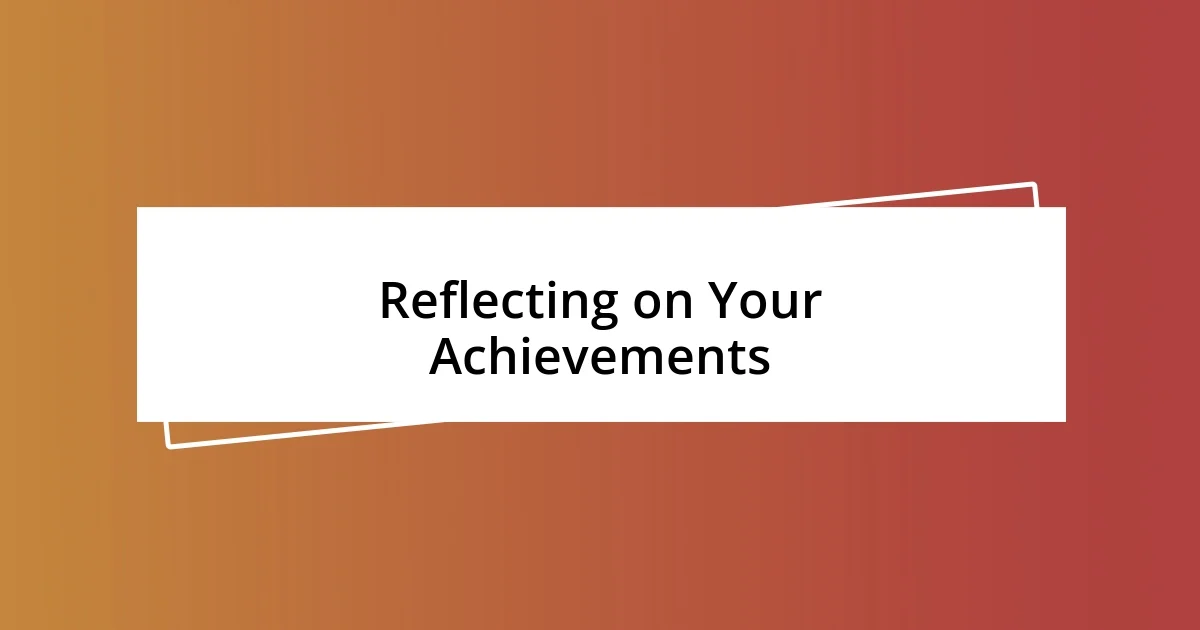
Reflecting on Your Achievements
Reflecting on my achievements has become a powerful antidote to imposter syndrome. I remember a time when I doubted my abilities after receiving a promotion. Instead of focusing on that nagging voice of self-doubt, I took a step back and listed everything I had accomplished to get there. That simple act shifted my perspective, reminding me of my hard work and the skills I had cultivated along the way.
There’s something profound about acknowledging your own journey. I recently sat down after a particularly challenging week and mapped out all the initiatives I had led. To my surprise, I realized I had collaborated with a diverse team to launch a new project, something I once thought was beyond my reach. It struck me that we often underestimate the value of our contributions and the growth we experience—even when it feels incremental. Have you ever taken the time to write down what you’ve achieved? It can be revealing.
In moments of doubt, I often return to this reflection exercise. I vividly recall a period where I felt like an imposter in my new role, questioning whether I deserved to be there. But as I revisited my list of accomplishments, it began to dawn on me that I had not just survived in that position; I had thrived. Each success, no matter how small, told a story of persistence and resilience. This practice of self-reflection not only builds my confidence but also anchors me in reality—reminding me that I have earned my place.














